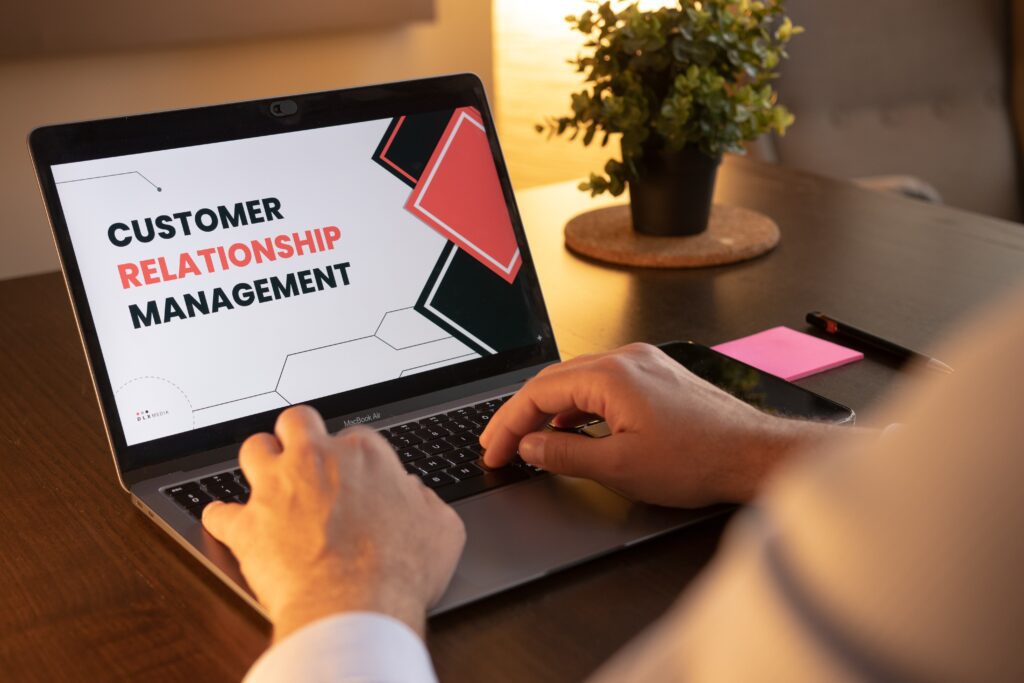The classic saying: “the customer is always right”, is deeply ingrained in our minds and will likely stay there forever. However, it’s been replaced by a new reality: “customers expect a quick response to their inquiries, regardless of the communication channels they use”. In today’s world, making a customer wait for a response – or even worse, not responding to their inquiry at all – can easily result in losing them. That’s just one of the reasons why we’re discussing how CRM addresses the biggest challenges in multi-channel customer communication today and helps businesses stand out from the rest. Once you’re done reading this article, you’ll have a clearer understanding of how CRM software works its magic and why it’s so popular.
First, we’ll cover the basics.
What is multi-channel communication (MMC)?
There’s an equation mark between multi-channel communication and reaching your customers on every platform they use. It’s an effort from your side to meet them where they are and make your communication more flexible and responsive. By relying on and utilizing MMC, you ensure that your customers feel connected and engaged with your business or brand, regardless of their preferred way of interacting with your company.
What is CRM?
In the simplest of ways, CRM (Customer Relationship Management) software works like your business’s well-organized personal assistant: it oversees and keeps track of every interaction with customers across all the pathways in your MMC strategy – whether it’s through your website, social media, or phone inquiries. The goal of CRM is to organize customer data (for instance: their preferences, purchase history, or concerns) all in a single place. It does so to improve customer relationships, boost retention (i.e., how long your customers stick around), and ultimately, drive sales growth by giving teams the insights they need to keep your customers satisfied and happy.
Why is CRM so crucial nowadays? – the story of customers going digital
Many social scientists refer to our current era as the “digital age”. When you summarize their lectures, it becomes clear that this means people – your potential customers – are constantly engaged with social media, making purchases with a single click and expecting instant responses to their digital inquiries. They’re not just scrolling; they’re doing research, gathering all the information they need before even considering a purchase. This makes CRM more important than ever.
Oh, and it’s not just about customers going digital; service-based industries, such as moving services, have also struck gold with CRM tools. Due to the specifics of their trade (more about those later), it was once challenging to react swiftly to various customer inquiries. However, that has all changed now.
All in all, without a solid CRM system, it’s easy to fall behind and miss those vital connections.
How CRM solves the biggest challenges in multi-channel customer communication
Now that we’ve taken care of the essentials, let’s see how CRM saves the day (in more detail).
Challenge #1: Navigating the communicational specifics of your trade
Everyone has different preferences, especially when it comes to their needs as customers. In the service industries, such as moving, this often means dealing with clients who are under stress and on tight schedules, requiring quick responses. CRM software significantly streamlines the process of managing leads as a mover across platforms like email, phone, and social media. When a potential customer reaches out—whether through a website form or by calling for a quote—CRM systems help keep everything organized. This ensures that responses are prompt and communication flows smoothly, so no lead falls through the cracks. Quick and efficient management of customer inquiries is essential for providing excellent service in this fast-paced environment.
Challenge #2: Different messages on different platforms (i.e., inconsistency)
The thing is: customers rely on brand consistency – there’s an ever-present need to trust your company. Now, imagine if they encountered different messages on your firm’s various platforms or communication channels, a different tone, or worse – conflicting information. That wouldn’t be so good, right? This is where CRM steps into the picture frame. It ensures that your communication stays consistent across all channels, so whether customers contact you via social media, email, or phone, they get the same clear, cohesive message. CRM can help centralize customer interactions and automate responses. Therefore, it eliminates confusion and keeps your brand voice uniform, building trust and creating a reliable experience that customers want to come back to.
Challenge #3: The management of big amounts of customer data
Multiple communication channels mean large amounts of data need to be analyzed. It can sometimes feel like trying to find a needle in the hay! It’s not surprising that – in the world of multi-channel communication – managing customer data can quickly become overwhelming. Luckily, CRM can assist: it helps you collect, organize, and analyze all that data in one place; it turns chaos into clarity and order. With CRM, you can track customer interactions, preferences, and behavior, making it easier to tailor your approach and improve engagement. The transformation of data into actionable insights: that’s all you need to make informed decisions and provide a personalized experience that keeps customers happy and loyal.
Challenge #4: Technical difficulties in streamlining various communication channels
Integrating various channels can be a technical challenge, especially when tackling the challenges in multi-channel customer communication. Once again, we’ll use moving services as an example of a business where every communication is of key importance. For moving companies, relying on unreliable systems can lead to missed messages and frustrated customers. That’s why opting for platforms with robust multi-channel integration capabilities is essential. MoversTech CRM software effectively streamlines communication across various platforms, ensuring that every customer inquiry, regardless of the channel, is captured and addressed promptly.
This seamless integration allows movers to manage leads more effectively, respond faster, and maintain a consistent brand message, all while ensuring that no important details go unnoticed. In a business where timing and clarity are crucial, this type of software can be a game-changer for creating a smooth customer experience.
Challenge #5: Reaching your audience effectively
In order to reach your audience most efficiently, segmentation is crucial. Break down your customers into groups based on demographics, behaviors, and preferences to communicate in a way that feels personal and relevant. You can utilize the segmentation tools in your CRM platform to simplify this process. Personalization takes it a step further – you can address customers by name, acknowledge their unique challenges, and offer tailored solutions that truly matter to them. When you show customers that you understand their needs, it makes all the difference. Tailored messages can significantly boost engagement and this approach can turn a casual inquiry into a loyal customer who feels valued and understood.
Conclusion
Now you see how CRM solves the biggest challenges in multi-channel customer communication. From ensuring brand consistency across diverse platforms to managing vast amounts of important customer data, CRM software is vital for businesses, regardless of their industry. It also helps streamline communication, making integrating various channels easier and reaching your audience effectively. With audience segmentation and personalized messaging, you can connect with customers on a deeper level, turning inquiries into lasting relationships, which are the foundation of the work you do. Embracing these CRM strategies will not only enhance customer satisfaction but also position your company for growth in an increasingly digital landscape.








